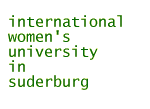
 |
Curriculum of project 5 |
| Dates | Competency, Content, Student studies | Extra |
|---|---|---|
| Week 8 04.09. - 07.09.2000 |
Competency: Mena-Abraham,
Lehwald Content:
|
Excursions to Hannover - Hägewiesen (6.9.00) and to Bielefeld - Waldquelle. (7.9.00). |
| Week 9 11.09.- 14.09.2000 |
Competency: Mena-Abraham,
Lehwald Content: 1) Dry SIRDO: to cure the mother earth and continue using the unit (pull product towards the south to start drying phase). To make bio-chemical and bacteriological analyses of samples taken during previous visits of the resulting product from compost toilets. 2) Wet SIRDO: a) Cost-benefit analysis; b) social action methodology; c) bio-chemical and bacteriological data evaluation; d) comparison between separated grey and black waters with mixed waters. 3) Visit to Lübeck-Flintenbreite. Students duties: To use the dry unit installed and to cure the mother earth. To study the SIRDO process and understand the aerobic process and the means to control it. To learn some micro-regional planning concepts and how to apply them to chose the adequate treatment for liquid and solid waste recycling. To learn statistical methods to evaluate bio-chemical and bacteriological data collected concerning the liquid and solid effluent of the wet SIRDO.To process samples taken during visits and compare with data from Mexico-USA border and from Xochimilco. |
Excursion to Lübeck-Flintenbreite (11.9.00) |
| Week 10 18.09. - 21.09.2000 |
Competency: Urban, Corella-Barud,
Papageorgiou Content: 1) Dry SIRDO: a) users' training devices; b) follow up techniques; c) social aspects and conditions in order to implement a dry sanitation process. d) Bio-chemical and bacteriological evaluation and comparison of data collected in Dry SIRDO units. 2) Wet SIRDO: Statistical analysis of data. To apply the methodology Planning for recycling to a particular case of interest for the students. Students duties: To use the dry unit installed and to cure the mother earth. To design educational means to introduce a dry sanitation programme in their own country, using art. |
|
| Week 11 25.09. - 28.10.2000 |
Competency: Corella-Barud,
Lehwald, Papageorgiou Content: 1) Dry SIRDO: a) To prepare BF extraction from unit installed in Suderburg. b) take samples in our unit; c) make bio-chemical and bacteriological analyses and compare them. 2) Wet SIRDO: Continue statistical evaluation and establish range of efficiency. Make proposals for planning recycling in students' communities in their own countries. Students duties: to present alternatives for an educational programme in students community. |
|
| Week 12 02.10. - 05.10.2000 |
Competency: Lehwald, Nowack Content: Excursions to composting company in Uelzen (2.10.00) and rubbish dumping site (Bork) with biological treatment. Methodology to establish how adequate these alternative are for our countries, why and how. Students duties: to determine the possibility for the SIRDO bacteria to grow in this climate, and to discuss their own programme for action when going back home. |
Visit to Uelzen and Bork. |
| Presentation |